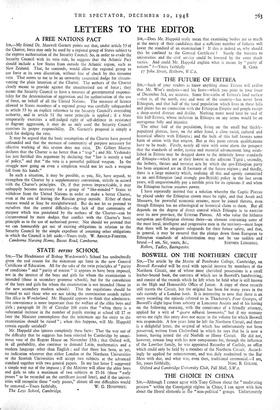LETTERS TO THE EDITOR
A FREE NATIONS PACT
Sm,—My friend Dr. Maxwell Garnett points out that, under article 53 of the Charter, force may only be used by a regional group of States subject to the express authorisation of the Security Council. So, in order to evade the Security Council with its veto rule, he suggests that the Atlantic Pact should include a few States from outside the Atlantic region, such as New Zealand. That, he contends, would allow the regional group to use force at its own discretion, without fear of check by this tiresome veto. That seems to me to be an unworthy casuistical dodge for circum- venting the plain intention of the Charter. The authors of the Charter clearly meant to provide against the unauthorised use of force ; they meant the Security Council to have a measure of governmental responsi- bility for the determination of aggression and for authorisation of the use of force, on behalf of all the United Nations. The measure of licence allowed to States members of a regional group was carefully safeguarded in article 53 by an explicit reference to the Security Council's overriding authority, and in article 51 the same principle is applied ; if a State temporarily exercises a self-judged right of self-defence in . resistance to flagrant aggression, it may do so only until the Security Council exercises its proper responsibility. Dr. Garnett's proposal is simply a trick for dodging the veto.
It may be argued that the basic assumptions of the Charter have proved unfounded and that the measure of community of purpose necessary for effective working of this system does not exist. Dr. Gilbert Murray declares that the Charter is no better than a " trap " ; and Mr. Vyshinsky has just fortified this argument by declaring that " law is merely a tool of policy," and that " the veto is a powerful political weapon. In the struggle now going on even a simpleton would not let such a weapon fall from his hands."
In such a situation, it may be possible, as you, Sir, have argued, to strengthen the Charter by a supplementary convention, strictly in accord with the Charter's principles. Or, if that proves impracticable, it may unhappily become necessary for a group of " like-minded " States to withdraw from the United Nations in order to make a better Charter, even at the cost of leaving the Russian group outside. Either of these courses would at least be straightforward. But do not let us pretend to ourselves that the central difficulty—the lack of that community of purpose which was postulated by the authors of the Charter—can be circumvented by mere dodges that conflict with the Charter's basic principle as to the use of authorised power. Nor should we pretend that we can honourably get out of existing obligations in relation to the Security Council by the simple expedient of assuming other obligations in which the Council is left aside.—Yours truly, W. ARNOLD-FORSTER.
Camborne Nursing Home, Basset Road, Camborne.














































 Previous page
Previous page